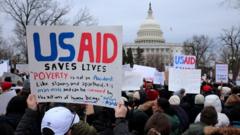The impending staff reductions at USAID have sparked legal challenges and criticism from former officials and health advocates, raising questions about the impact on international humanitarian efforts.
**USAID Staffing Crisis: Major Cuts Loom Amid Controversial Trump Policies**

**USAID Staffing Crisis: Major Cuts Loom Amid Controversial Trump Policies**
As USAID prepares to reduce its workforce to just 294 amid sweeping budget cuts, concerns grow over the future of global aid provision.
USAID, the United States Agency for International Development, is facing drastic staffing cuts that could see its global workforce shrink from approximately 10,000 employees to under 300. This unprecedented move comes as the Trump administration enacts significant reductions in government spending, stating that nearly all non-essential staff will be placed on administrative leave starting Friday night.
Following advice from prominent figures including Elon Musk, the administration has already frozen hundreds of aid programs globally, reflecting a clear pivot toward prioritizing domestic concerns over international support. Critics argue that these budget cuts could dismantle one of the most vital components of U.S. humanitarian efforts, as USAID has long been a leading provider of foreign aid and assistance during crises.
Polling data shows a substantial amount of skepticism regarding foreign aid among the American populace, with a March 2023 AP-NORC survey indicating that around 90% of Republican respondents believe the U.S. is overspending on such initiatives. This general sentiment has fueled Trump’s approach to transform government operations, as he aims to implement sweeping cuts through his new advisory body, the Department of Government Efficiency (Doge), headed by Musk.
Former USAID leaders, such as Gayle Smith, have vehemently opposed the cuts, asserting that reducing the agency's size sends a dangerous message about U.S. commitment to humanitarian efforts. They emphasize that assistance from the U.S. is crucial in times of need and warns that the cuts could damage the longstanding reputation of the U.S. as a reliable partner in global crises.
The American Foreign Service Association (AFSA) is advocating against the administrative changes, having initiated a legal proceeding against the government to block the cuts, which they claim are unconstitutional and unlawfully executed without congressional approval. Their lawsuit demands that an acting director be reinstated, offices be reopened, and aid programs resumed, citing the immediate effects on global aid efforts and national security.
Amidst this turmoil, nonprofit leaders like Nelson Otwoma, who relies on USAID for funding HIV programs in Kenya, report devastating consequences. He shared how the freezing of USAID funding has led to significant layoffs and left vulnerable populations without essential medications, creating a sense of uncertainty and fear about future conditions.
While Secretary of State Marco Rubio maintains that the U.S. is not completely withdrawing from foreign aid, he emphasizes that continued support must align with American priorities and goals. Rubio asserts that any aid program maintained will need to be defensible and justified to avoid putting U.S. interests at risk.
As the deadline for staff layoffs looms, the ramifications of this crisis extend far beyond U.S. borders, potentially reshaping the landscape of global humanitarian aid and the future of one of the largest aid agencies in the world.






















